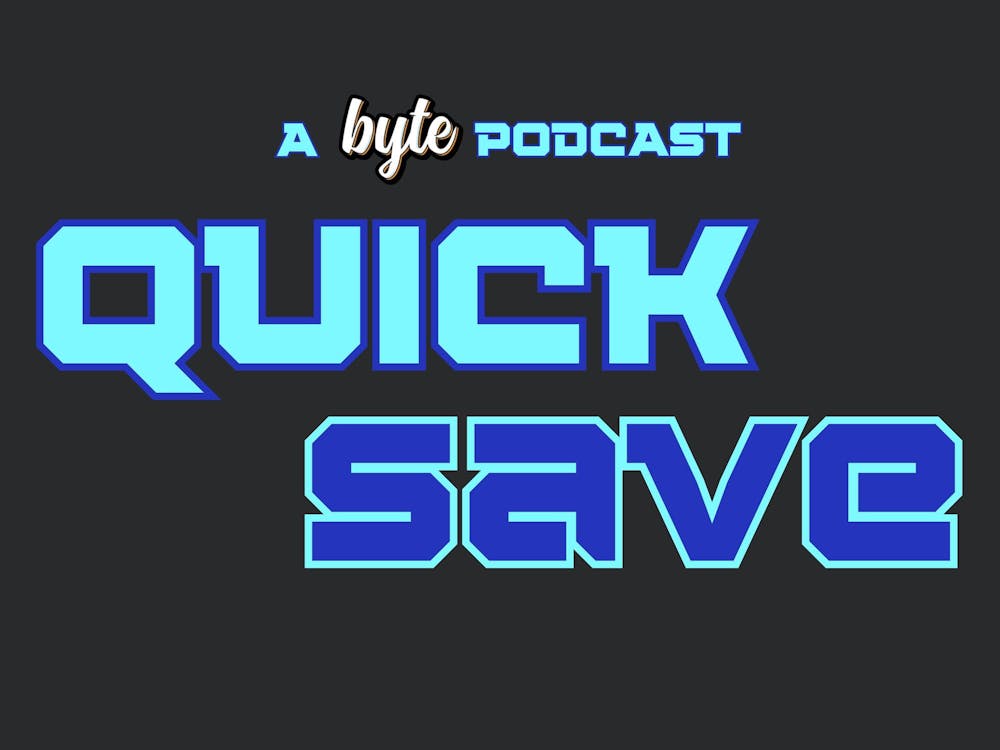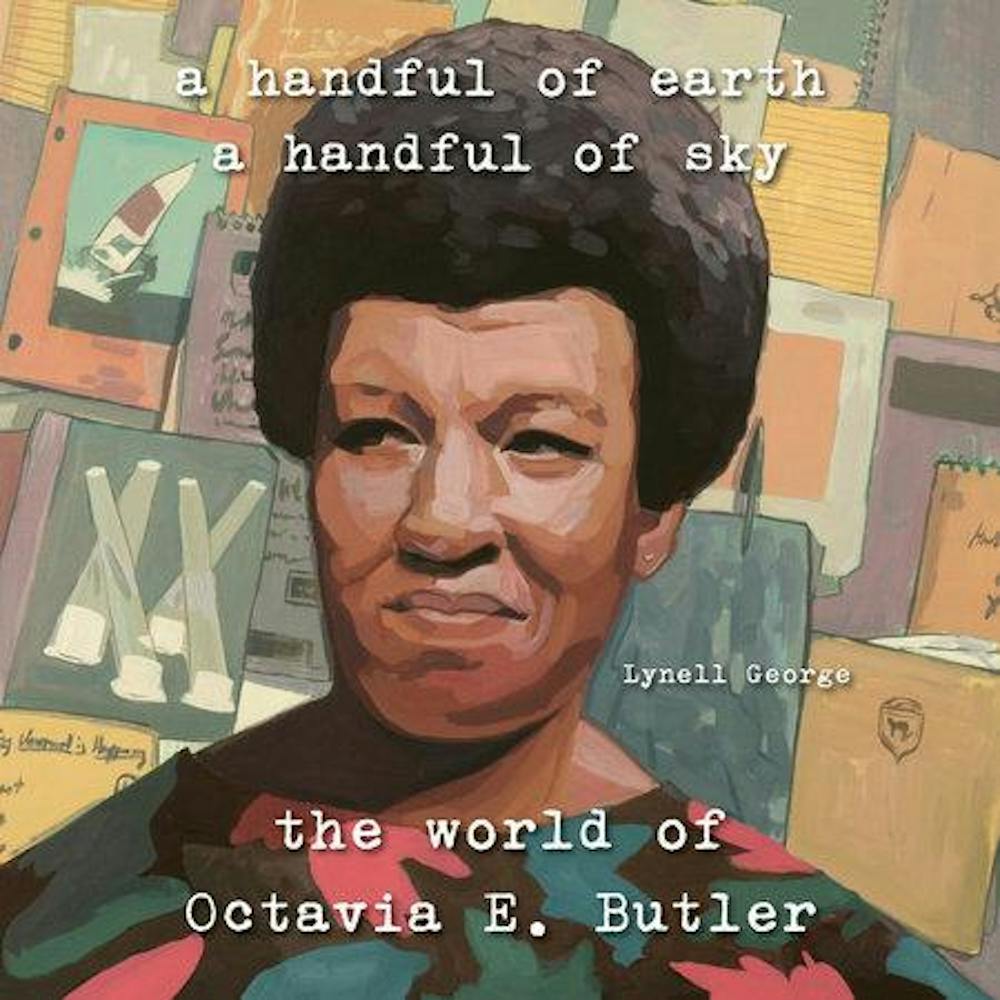The opinions and views expressed in this article are those of the author and do not reflect the opinion of Byte or Byte’s editorial board.
When Mirror Indy published an article about a free book fair in the Indianapolis and Lawrence campuses back in August 2024, I had no idea such an oasis could exist. With my tote bag in hand, I was ready to explore the many tables and rooms filled with books for people to roam and take as they pleased. After leaving the children’s book section, I stumbled upon the biography section. I picked up a book titled, A Handful of Earth, A Handful of Sky: The World of Octavia E. Butler. The cover, painted by artist Jon Stitch, captivated me as a fellow painter myself. To be frank, I unfortunately had never heard of her until that day. Flipping through the pages, I saw imagery such as to-do lists, bus passes, and a still of a beautiful California style bungalow. Immediately feeling a sense of comfort in the book, my gut urging me to take it home. After returning home later that day, I had no idea what was in store for me when I flipped the first page. The exclusive knowledge I was about to learn about an extraordinary writer’s life, would soon change my trajectory as an aspiring one.
Deconstructing the Brain of a Writer, by a Writer
A Handful of Earth, A Handful of Sky: The World of Octavia E. Butler is a biography about the esteemed African American science fiction author, Octavia Butler. Who was the first African American woman to pioneer through the white, male dominated genre. Written by award winning Los Angeles based essayist, journalist, and nonfiction author, Lynell George. Throughout the book, George gathers information from Butler’s personal archive from the Huntington Library’s Manuscript Collections in San Marino, California. They received this vault of a collection in 2008, and according to the Huntington Library, what they received were “two file cabinets and 35 large cartons, comprising more than 8,000 items of Butler’s possessions and paraphernalia.” On the endnotes section of the book, George state’s that she researched and compiled information through a staggering number of Butler’s possessions including but not limited to: diaries, journals, letters, pages of a manuscript in process, scratch pads, back of used envelopes, commonplace books, speeches, library call slips, essay and story drafts, school notes, calendars and datebooks, school progress reports, bus passes, yearbooks, and contracts. This grand amount of research shows how far the author went into the making of this biography. Even referring to Butler as a “human notebook” in the title of the fifth chapter.
George’s study of Butler is undeniably distinguished, and throughout reading this biography it shows. To the point where you almost believe that it is being written by Butler herself. There were also many times reading where I was incredibly stunned by George’s articulation, and formatting, submitting a strong and unique writing style. George uses mostly journal entries to guide us through the pages and chapters. Using Butler's thought process, as a guide and a form of sequentializing the book. Jumping from her perspective, to Butler’s, George allows us to process and read her reflections on Butler’s points. Studying her intellection within the confines of Butler’s pink, and tan notebook.
An Empathetic Experience
Empathy is a big theme throughout George’s notations. We learn what drew Butler to science fiction and her start to a life long love of reading. We have a front row seat into her writing process. Planners from 1983 showing Butler managing herself to wake at 4:30 a.m to write every day. Images show us grocery lists, shoe receipts, and library cards, highlighting the human side of her. The everyday, mundane tasks a Hugo award winning author goes through. Instilling in the reader that Butler’s life is just like ours. Contrasting with the mundane, we see Butler’s grit, and aggressiveness of wanting, needing to become a writer. It was a fact she was not willing to take as fantasy, especially as an African American woman, the cards were already stacked against her. As readers, we go back and forth with the fact that, even though Butler worked hard every day to get closer to her dreams, she still had to take care of everyday responsibilities like bills, putting food on the table, and making sure you have your bus pass to get from point A to B. We get a direct look into Butler’s desires and uncertainties and what she chose to prioritize in times of turmoil. We go through grief with Butler when the library she grew up going to, burns down. We go through her phases of self discovery and self doubt. We live, breathe, and learn the world and psyche of Butler through and through.
I had the chance to interview Lynell and ask her some questions about this wonderful project. As I believe it has made an impact on my life as a writer, not only with learning about Butler and her journey of becoming one, but observing George’s writing style, and how she chose to reflect on the respectable author. After reading this book I knew that the world needed to know that it existed, and I know that it will be infectious to other desiring writers, just like it inspired me. Via email, we discussed the following:
AA: Who would you recommend this book to and why?
LG: From the very beginning I had hoped that this book would land into the hands of any person who is attempting something difficult. It didn’t have to be a writer or an artist, but someone who was doing something unusual and/or complicated, perhaps something that other people didn't understand. Butler had figured out so many helpful ways to encourage herself and keep herself on task and that was what was what I felt, was powerful for people working solo. She didn't give up. She made a way.
AA: For Octavia, breaking into the science fiction world as one of the only African American women to do it at the time can be described as historical. How important is being an author to the African American community even in today's society?
LG: I think, as African American writers, exploring our own diversity of interests, experiences, points of view on the page is so very important. We are embracing our own complexity. I think, more than ever, writing is about claiming space and finding your purpose and people. One of my favorite writers, James Baldwin said: "The place in which I'll fit will not exist until I make it.” I really think that this is one of the absolute most important things that writing and writers can do.
AA: What would you say is the biggest impact this body of work has had so far?
LG: I am always thrilled to hear that people are using this book as a notebook themselves. That they have begun to create lists, or affirmations, or have begun to journal like Butler did. I love to see their copies of the book filled with bookmarks and Post-its. I have received correspondence from readers who have shared photos of their own notes in the margins of the book. Or notes from people who say they have created a new work-practice that in some ways is based on Butler's own, where they are finding time in the tiniest corners of very busy days to keep a diary full of observations. They are saying yes to themselves—and their projects, their purpose—first. It means that part of Octavia's hard work has meant something. It means that she continues to inspire. I appreciate their curiosity with gratitude.
The Remnants of a Euphoric Read
Coming across this book was a chance encounter, and I'm so glad it happened. Anyone who is an aspiring writer, or who is already a professional one, I highly recommend this book. Especially for my fellow African American writers. From learning about Octavia Butler’s life of becoming a writer, her writing process and undefeated discipline, to Lynell George’s incredible use of words, and captivating storytelling, there is so much to learn here. There is also a philosophical take here. About how despite all odds that are in the way, you can push through with hard work and discipline. You will leave this book with a stronger sense of purpose and dedication to such a wonderful craft. And you will dive into one of Butler's award winning books having an immense amount of empathy in knowing where the writer of these stories originated.

Graphic created by Willow Emig with image provided by Angel City Press.
Sources: MirrorIndy, MirrorIndy, AngelCityPress, JonStich, OctaviaButler, LynellGeorge, TheHuntington, TheHuntington, TheLegacyProject
Photos: AngelCityPress
Contact Amira Alquraishy with comments at asalquraishy@bsu.edu or on Instagram @amiruh.z.




















